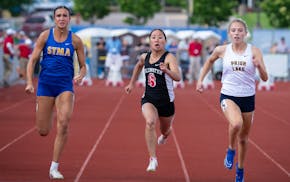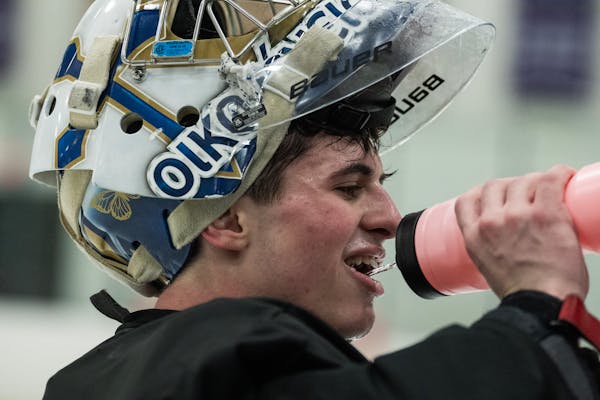A record number of Mr. Hockey nominations caused award chairman Marty Mjelleli to lose count.
"Normally it's the same 10-15 players," Mjelleli said of an award presented each year to the state's top senior skater. "This year it was at least double, mid-30s maybe."
Such metrics speak to the strength of Minnesota high school hockey this season. Each class of this week's state tournament, the carrot that convinces many top players to remain for the senior season, will feature several of the best players, including Mr. Hockey candidates Jackson Nevers (Edina), Nolan Roed (White Bear Lake), Carson Pilgrim (Warroad) and Gavin Uhlenkamp (Chanhassen).
Those star players bring the speed and skill to thrill fans both partisan and casual alike.
Seniors unable to break through tough sections must wait until Sunday's Mr. Hockey banquet at the St. Paul RiverCentre, including candidates Hagen Burrows, Javon Moore and John Stout (all three of Minnetonka), Noah Urness (Roseau), Rhys Wallin (Wayzata) and Louie Wehmann (Providence Academy).
Just outside of the top 10 are solid seniors such as Harper Searles (Centennial) and Wyatt Farrell (La Crescent-Hokah).
Other great non-seniors also made their mark this season, especially juniors Jackson Rudh at Park of Cottage Grove and Cooper Simpson of Shakopee. Rudh helped generate crowds not seen recently for the Class 2A, Section 3 quarterfinal played at the Cottage Grove Ice Arena. Simpson, meanwhile, helped the Sabers win their first South Suburban Conference championship.
Reasons vary as to why this wave of top players stayed in high school hockey. Coaches who voted on the Star Tribune All-Metro teams and the Metro Player of the Year offered their thoughts over a recent lunch at the Star Tribune's downtown Minneapolis office.
1. High school coaches' influence
Coaches desire to protect the integrity of the high school game and not lose so many top-end players to the junior leagues. And they are sharing their wishes with players, especially the juniors and senior, in hopes of starting a chain reaction in the locker rooms. And the coaches, by and large, are united more than ever, supporting one another and sharing best practices.
"Our coaching staffs are that good," said Mike MacMillan, executive director of the Minnesota High School Hockey Coaches Association. "A lot of them are operating like a college program, and it's a good experience for the top players."
2. Players gaining perspective
"Our kids in Minnesota are spoiled," one coach said. "They don't know how good they have it here until they are living in a billet home basement with no cable. They are seniors in high school, not rookies in the NHL."
MacMillan said, "We have premium development opportunities for players ages 15-18, and I think the top players are seeing that. They are getting things here that they don't get in the Tier I programs. And the parents don't want to pay thousands of dollars to send their kids away.
"We are doing a good job of developing players, not just oversystemizing them," MacMillan said. "We're developing athletes to perform in any system."
Another coach said, "Players are seeing that it's not hurting them to stay."
3. Numbers don't lie
Chanhassen High School won't move to a neighboring community if the Storm fail to win a Class 2A title this week. Players aren't in danger of being traded. Corny as it might sound, Minnesota's community-based, school-centered program offers players the chance to work beside teammates to achieve their goals, whether it be to upset a top team, win a conference title or, for the fortunate few, capture a state title. These dreams aren't dead, though they are shrouded in recruiting concerns and chatter about transfers.
MacMillan provided a chart tracking how Minnesota players are doing at the NHL level. In the 2022-23 season, the state had a record 67 NHL players, 59 of whom played high school hockey at such places as Chisago Lakes, South St. Paul, Brainerd, Hopkins, Rogers, Cloquet, East Grand Forks, Baudette, Forest Lake and Delano. The next highest state has not surpassed 50 NHLers in a season. States with an emphasis on Triple-A teams instead of community-based teams include Michigan (37 NHL players), Massachusetts (32) and New York (30).
"We cannot go their direction," MacMillan said. "The culture we have takes everybody, not just one thing."
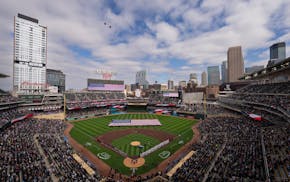
Live from Target Field: Twins face Astros in home opener

What's next for the Vikings? NFL draft, schedule release, OTAs and more
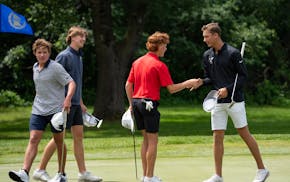
Defending champs return for more in Minnesota high school golf
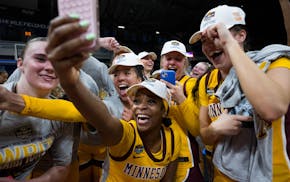
After winning WBIT title, Gophers women's basketball team looks poised to take another step next season
